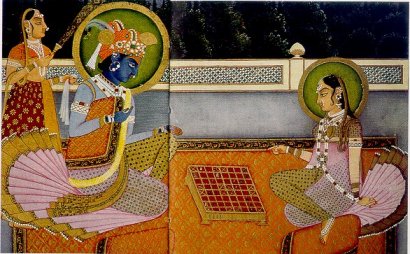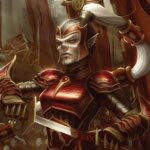This is an interview with renowned game-designer Alessio Cavatore. Alessio and I talked on Skype about his latest game, Loka: The World of Fantasy Chess, which is currently looking for the support of enthusiastic gamers and miniature painters on Kickstarter.
Talking to Alessio on Skype proved to be a fickle thing (or rather, my internet-connection did) and we were interrupted a few times. I want to once again thank Alessio for granting me this interview and for having the patience to see it through despite all technical difficulties.
Alessio and I broadly talked about four topics:
- The Meaning of “Loka” and the History of Chess
- Chess, Loka and Game Design
- Loka the Game, Elemental Factions and Campaigns
- Thoughts about Kickstarter
It greatly enjoyed asking Alessio questions (who wouldn’t?) and getting first-hand insights into his thoughts and ideas behind Loka. I hope you’ll find the interview as informative as I did.
There’s also an exclusive preview at the very end of this interview!

#1 – The Meaning of “Loka” and the History of Chess
Zweischneid: At the of an interview, I usually ask people to talk a bit about themselves. Obviously, you are well known in the industry, so I thought I start by asking you about Chess, which is the basis for Loka. What is the appeal of Chess to you as a player and game designer?
Alessio: [laughs] I have been asked that question a lot recently!
Zweischneid: OK. So what questions have not been asked? What question would you have liked to be asked? I would be happy to ask it!
Alessio: Well, one question I have not been asked very often is: What does Loka mean? Does the word “Loka” mean anything?
Zweischneid: Alright. What does Loka mean? Does it mean anything?
Alessio: Loka is a word from Sanskrit. The meaning of it is “the world” or “the universe”. It is used a lot in Hinduism for many spiritual places.
Hinduism, or ancient India at least, is where Chess originally comes from. The elements also play a strong role in this ancient culture and its cosmology. One of the appeals of Chess – which I wanted to show with Loka – is the rich history of the game. The history of Chess is amazing.
The current form of Chess was born in medieval Europe, but it was brought to Europe from India by Arab Merchants along the Silk Road.
In ancient India, the game was known as Chaturanga or Chaturaji. In many ways, they were different games from the Chess we know today. They used different pieces, including elephants and chariots. Chaturaji was a 4-player game. Yet they are the historical roots of Chess.

Depiction of Hindu Gods playing Chaturanga (Wikipedia)
#2 – Chess, Loka and Game Design
Zweischneid: I remember reading an interview with you about Shuuro a few years ago, where you said the advantage of using Chess as a basis is that very many people know the basic Chess moves and rules, even if they don’t really play Chess. I think there is a similar idea behind Loka?
Alessio: What is so fantastic about Chess is its balance, its simplicity and purity.
The drawback to Chess is that, because of this, it has become very absolute and scientific. Chess has perhaps lost a bit of that fun element.
My ambition with Loka was to bring some of the fun back in by adding more colour, dice-rolling and fantasy terrain. But I also wanted to keep the balance and cleanliness of Chess.
The thing about Chess is that the rules are so simple, they fade into the background. You don’t think about the rules as you play Chess.
This is the “Holy Grail” of game design.
Very often, when people play wargames, they will run into disagreements over the rules. There are questions about “How is this thing resolved?” or “How do these effects work?”
The more complexity there is, the more likely there will be issues that are unclear or not covered by the rules. It is almost inevitable.
It may well happen with Loka too, as I add new rules and complexity, but the goal – the “Holy Grail” – is to create a set of rules that is as “invisible” during the game in Loka as it is in Chess.

Playtesting Loka (not the final board or miniatures, obviously)
#3 – Loka the Game, Elemental Factions and Campaigns
Zweischneid: So let us talk about the things that make Loka different. When I look at the Kickstarter page for Loka, the first thing I notice are the different factions, based on the different elements? Will the factions play different? Will a Fire-Bishop be different from an Earth-Bishop?
Alessio: No. Not at the moment. There is only an aesthetic difference between the factions. There are no different powers. I did not want this game to be about what factions you choose, but about your skills, your luck and fun.
The idea was there to make the factions different. This could perhaps be a fourth bolt-on rule to the three options that are currently there. If I were to do this, it would probably with a set of cards for each of the factions, which would be themed to the different elements.

Earth King for Loka
Zweischneid: If this would be a fourth “bolt-on” set of rules in Loka, than there are currently three?
Let me see: The terrain? The combat-resolution? And the ability to build different armies or lists?
Alessio: That is correct. These are the three different add-on rules: the random fantasy-terrain, the dice and the army-lists.
You could play Loka with any one of those add-ons, with all of them, or with none of them, at which point you would be playing regular Chess.
Zweischneid: Interesting. I really like this modular approach.
However, something else I noticed on the Kickstarter-page were hints for a system for campaign-play. How would a longer campaign work in Loka?
Alessio: I have a campaign-system in mind, but it is not part of Loka yet.
It would be something along the lines of other empire-conquering games, at least for the basic principles. The players would try to conquer territories, take castles, etc… .
To resolve the battles you would play a game of Loka.
Depending on the territory you fight over in the campaign, there might be different types of terrain on the Loka-board. For example, if you fight over a forest-area, you would most likely have more forest terrain on the Loka-board.
The make-up of the armies would also be influenced by the campaign. There might even be asymmetrical battles, where one side has a smaller army than the other.

A Map for the World of Loka with Vayu, the Aerial Kingdom to the right
Zweischneid: So you would actually produce a map, based on the one in the Kickstarter-video, for this campaign-option?
Alessio: Yes, certainly. Hopefully we can produce it as a stretch-goal, if the Kickstarter gets there. If not, we will likely make this a future expansion for Loka.
Currently, my idea is to make it so that you can hang the campaign-map on a wall, showing the current status of the campaign. It would remove a lot of the hassle of storing and unpacking the campaign-map between games.
Zweischneid: Speaking about the world and the map, will there be background to the world of Loka in the game, will you flesh out the story for the different elemental factions?

Air King for Loka
Alessio: Not in a major way, no.
This is a board-game, so it doesn’t need a lot of detailed background. Think of games such as Talisman for example.
In fact, I think that background for games like this tends to be a lot better if it consists mainly of hints and bits spread throughout the book. This tends to work much better, I believe, in letting your imagination build the world, not to limit and constrain it with too many minute details.
Think of the books by J.R.R. Tolkien for example. Tolkien was a master of hinting.
You think of the Battle of the Pelennor Fields and you think of this huge, epic battle. However, when you read the text, it is surprisingly short. A lot of it is only short sentences hinting at what is happening, letting the reader’s imagination fill in the rest.
#4 – Thoughts about Kickstarter
Zweischneid: As final question. As you are a veteran of the wargaming industry, I would love to hear some of your thoughts on Kickstarter more general. You previously worked on games published through Kickstarter. Now, Loka is your game on Kickstarter.
What are your thoughts about Kickstarter?
Alessio: Kickstarter certainly changed the market for miniatures games.
I think it is a fantastic tool as it allows you to gauge the market, ahead of time, to see how big and popular your game is most likely going to be.
Before Kickstarter, you would not be able to know in advance how many copies you would need for a new game. You produce them and they might end up sitting in the warehouse costing a lot of money. Or you might make too few of them.
Kickstarter greatly reduces this risk for investors and entrepreneurs.
Kickstarter certainly has other risks. You need to be very careful in calculating your costs: the production, the taxes, the shipping, etc.. . If you make a mistake with any of these, you might end up promising more than you can afford and end up making a loss.
And of course, there is more and more competition on Kickstarter now.
Still, if used correctly, Kickstarter can be a very powerful tool.
Zweischneid: Many, many thanks for taking time for this interview, Alessio. It’s been great talking with you and hearing your thoughts on Chess, your Kickstarter and the game of Loka.
Alessio: My pleasure!
Well… once again many thanks to Alessio.
This is one of the longest interview’s I ever did, but you don’t get to talk with people like Alessio very often! And there is another special treat, thanks to Alessio. He sent me the fantastic picture you see below, giving me the opportunity to present the Vayu Rook from the Loka Air Chess Set!

Vayu Rook (Air Chess Set) for Loka
Let me know what you think of the interview, the rook and of Loka: The World of Fantasy Chess!
Z.





















